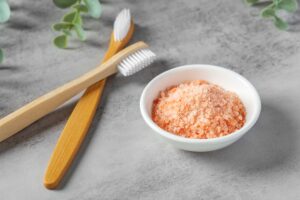Is a Salty Smile Good for Your Teeth?
November 14, 2023

You probably already know that limiting your consumption of sugar can lower your chances of developing tooth decay or gum disease. Did you know, though, that salt also can impact your teeth? It’s important to understand the effects of what you’re eating so that you don’t accidentally damage your smile. If your teeth are decayed because of damage from harmful ingredients, you could end up with a dental emergency like a broken or chipped tooth, a root canal, or worse. To avoid dental problems, keep reading to learn more about how salt impacts your pearly whites.
Is Salt Bad for Your Teeth?
You may be surprised to learn that salt might be hurting your grin, but there are some definite disadvantages, like:
- Increased bacteria. A lot of salt content can be found in carbohydrates like breads, pasta, and crackers which are broken down into simple sugars and starches once ingested. Both spell trouble for your teeth because the starchy ingredients can stick to them and cause build-up, while sugar attracts unwanted bacteria that contribute to cavities.
- Unhealthy eating habits. Many foods with high salt content are also pre-packaged snacks that attract germs that produce acids that weaken the enamel of your teeth.
- Reduced calcium. Your body excretes excess calcium if you eat a high-sodium diet, which leaves your teeth weaker and unsupported in your jawbone. Yikes!
Are There Any Advantages to Salt?
Though there are some risks if your meals are too rich in sodium, having a small amount can be beneficial in the following ways:
- Saltwater rinses. If you’ve ever had a chipped or broken tooth or are recovering from a root canal or other oral surgery, your dentist may have recommended salt water rinses. This is a natural way to gently disinfect the area without exposing the wound to abrasive chemicals.
- Maintains pH balance. Acids from bacteria and the foods you eat deteriorate your protective enamel. Salt neutralizes the pH balance in your mouth to avoid potential damage.
Though too much salt can be risky, it’s necessary in smaller amounts. It can keep your smile clean and helps your body maintain the proper balance of water and minerals for optimal well-being.
If you want to avoid some problematic dental pitfalls, it’s a good idea to minimize how much salt you’re eating. That way you’ll have enough to give your body what it needs to keep moving all while maintaining ideal oral health!
About the Author
Dr. Natalya Nagornaya graduated from the University of Illinois- College of Dentistry in 2001 and has nearly 19 years of experience. She takes pride in providing cosmetic, restorative, and general dentistry services to patients of all ages. She and her dedicated team believe that every individual deserves honesty, respect, and effective communication that ensures their oral health care needs are met. If you’d like to schedule an appointment, you can request one on the website or by calling (847) 634-2525.
No Comments
No comments yet.
RSS feed for comments on this post.
Sorry, the comment form is closed at this time.




